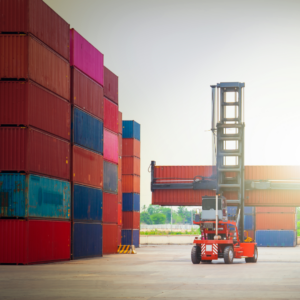
AI-Powered Digital Freight Forwarding
Digital freight forwarding has emerged as a pivotal component in modern logistics, leveraging AI to automate and optimize various processes. Companies like ExFreight utilize AI-driven technology to provide personalized solutions, enabling businesses to make smarter decisions for their supply chains.

Investment in AI-Driven Freight Companies
The growing demand for artificial intelligence has driven a wave of investments in freight companies seeking to integrate advanced technology into their operations.
Investments in this sector focus on improving logistical efficiency, optimizing resource allocation, and providing innovative financial solutions for carriers and operators. Many companies are allocating capital to enhance fleet management automation, predictive demand analysis, and integrating digital systems that facilitate strategic decision-making.
These investments reflect the increasing interest in digitalizing freight transportation, which aims to reduce operational costs, minimize downtime, and boost competitiveness in an ever-evolving market.
Advancements in Freight Technology
AI is at the forefront of advancements in freight technology, driving innovations that transform traditional operations. Companies increasingly adopt AI-powered solutions for route optimization, predictive maintenance, and supply chain visibility challenges. For example, AI models can predict shipping volumes, optimize routing, and reduce empty miles by analyzing historical data, seasonality, and market trends.

Enhancing Logistics Management with AI
Logistics management is experiencing a paradigm shift with the integration of AI, enabling more efficient and effective operations. AI applications in logistics include demand forecasting, warehouse automation, and inventory management. By leveraging AI, companies can anticipate demand fluctuations, optimize stock levels, and automate warehouse processes, resulting in a more responsive and efficient supply chain.
For instance, AI-powered systems can analyze vast amounts of data to forecast demand accurately, allowing businesses to adjust their inventory levels proactively. Additionally, warehouse automation through AI reduces manual labor, minimizes errors, and accelerates order processing times, contributing to overall operational efficiency.
Building an Efficient Supply Chain through AI
The application of AI in supply chain management is pivotal in building more efficient and resilient operations. AI facilitates real-time monitoring, predictive analytics, and enhanced decision-making capabilities, enabling companies to respond swiftly to disruptions and optimize their supply chain processes.
By implementing AI-driven solutions, businesses can achieve greater visibility across their supply chains, identify potential bottlenecks, and
The escalating demand for artificial intelligence significantly influences investments in freight services, leading to transformative changes across digital freight forwarding, freight technology, logistics management, and supply chain efficiency. As AI continues to evolve, its integration within the freight industry is poised to drive further innovations, optimize operations, and enhance service delivery. Businesses that embrace these AI-driven advancements will be well-positioned to navigate the complexities of modern logistics and maintain a competitive edge in the dynamic market landscape.



Leave A Comment
You must be logged in to post a comment.